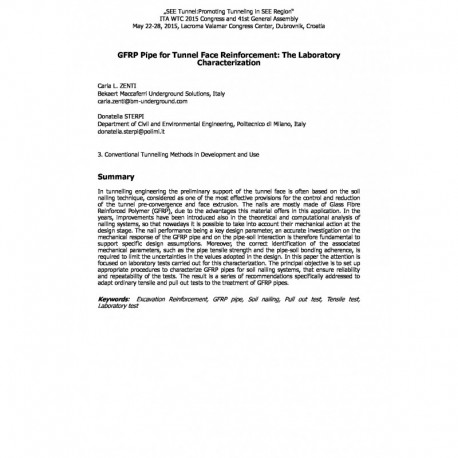Cart
0
0
No document
0,00 €
Total
Document successfully added to your shopping cart
Quantity
Total
There are 0 items in your cart.
There is 1 item in your cart.
Total documents
Total shipping
To be determined
Total
Search & filter
Search for a publication
Search & filter
GFRP Pipe for Tunnel Face Reinforcement: The Laboratory Characterization
wtc2015_full_sterpi
In tunnelling engineering the preliminary support of the tunnel face is often based on the soil nailing technique, considered as one of the most effective provisions for the control and reduction of the tunnel pre-convergence and face extrusion. The nails are mostly made of Glass Fibre Reinforced Polymer (GFRP), due to the advantages this material offers in this application. In the years, improvements have been introduced also in the theoretical and computational analysis of nailing systems, so that nowadays it is possible to take into account their mechanical action at the design stage. The nail performance being a key design parameter, an accurate investigation on the mechanical response of the GFRP pipe and on the pipe-soil interaction is therefore fundamental to support specific design assumptions. Moreover, the correct identification of the associated mechanical parameters, such as the pipe tensile strength and the pipe-soil bonding adherence, is required to limit the uncertainties in the values adopted in the design. In this paper the attention is focused on laboratory tests carried out for this characterization. The principal objective is to set up appropriate procedures to characterize GFRP pipes for soil nailing systems, that ensure reliability and repeatability of the tests. The result is a series of recommendations specifically addressed to adapt ordinary tensile and pull out tests to the treatment of GFRP pipes. Laboratory test




